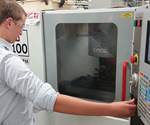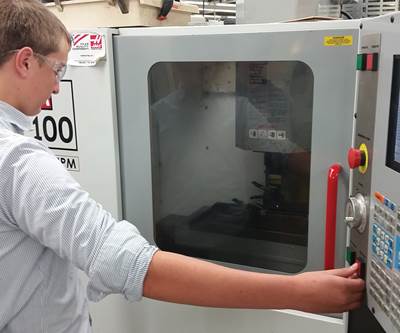Skills Center: Apprentice Training - Setting Expectations
Expectations for employee work habits should be established with each new hire on the first day of work and then followed up on in regular meetings.
Last month, I presented the value of holding regular meetings with new employees that focus on helping those employees develop good work habits. This is particularly important as part of a structured apprenticeship program so that the apprentice is in constant communication with company leadership. You want the apprentice to be constantly aware of management’s expectations. It can be very frustrating to invest a lot of time and training into a person only to have him or her leave the company or be terminated for reasons that could have been resolved with better communication.
Expectations for employee work habits should be established with each new hire on the first day of work and then followed up on in weekly meetings for the first three months of employment. After that period, I recommend monthly meetings to monitor development. Regular and scheduled communication builds trust and helps avoid surprises.
The first step to adding this element to a structured apprenticeship program is building an internal team of trusted employees to help establish the topics that will be addressed in each meeting. Here are a few of the most common topics:
Attendance and punctuality. Expectations for attendance and punctuality vary among companies, so don’t assume a new employee knows your expectations. It may seem like common sense would prevail or that it is a topic too simple to even address, but you must inform each new employee about your requirements in these areas. I have worked with companies that expect each employee to be working at the very start of the shift, whereas others do not seem to mind employees taking five or 10 minutes to get some coffee or change their shoes. Also, what about breaks? Does the company allow employees to start cleaning up five minutes prior to the actual scheduled break time? What about any meetings a new employee might need to attend? Do meetings start on time, or do they typically begin a few minutes after the stated start time?
When it comes to employee attendance, I strongly encourage shop managers to get creative with their policies for apprentices. I have noticed that a major misalignment of expectations for 18- to 22- year-old workers in the shop environment has to do with how much time off from work they are allowed. Hard-working, intelligent young people are under a lot of pressure to attend college, so convincing one of these young people not to go to college can be difficult. Often, they are drawn to the college lifestyle, which can mean going out late with friends, having summers off, and Christmas and spring breaks. In our industry, we typically don’t have these perks.
I have seen too many apprentices pressured into joining their college friends on spring break at the expense of their careers. I encourage companies to develop a policy that allows these young workers some flexibility, so they don’t feel like they are missing out on life experiences. This flexibility does not have to be in the form of paid time off, just enough that they can miss some time without jeopardizing their employment.
Speed of work. Some companies pride themselves on having a fast-paced work environment, so a new person who seems to move slowly might get criticized by his peers or supervisors without even understanding why. Walking with a sense of purpose, not stopping to talk to others unnecessarily, staying on task and moving quickly supports a strong atmosphere of urgency that customers like to see when they visit.
Coaching an apprentice on how to remain focused on the tasks at hand also may be necessary. Many of us were fortunate to learn how to do this in high school through after-school jobs. Unfortunately, with academic and sports demands, fewer teens are able to work during high school to learn these valuable lessons prior to starting their careers.
Personal accountability. Many companies do not want to employ people who blame other people and circumstances for their own mistakes, and for good reason. A culture of blame can destroy a company very quickly from the inside out. Taking time to articulate that personal accountability is a crucial part of the company’s core values will go a long way in helping your apprentices and new employees be successful.
Explain how the company has handled mistakes in the past. Make sure employees understand that most people do not lose their jobs when they make mistakes. Let them know that errors are generally viewed as learning experiences. Take the fear out of making mistakes and tell them to own up to their missteps so they can learn from them. Clearly stating that all employees are expected to be personally accountable to their work and actions will set a high standard of behavior and build a strong foundation for a good work culture.
Positive attitude. Oftentimes, new hires quickly adopt a poor attitude about their jobs, modelling existing employees who developed such bad habits years ago. They might complain about the work they have been assigned or criticize other people, including management. This behavior must be addressed as soon as it is identified. Explain that it will not be tolerated and that they are expected to approach their job with optimism and energy, no matter who they are working with or what they are asked to do. Explain the importance of maintaining a positive attitude about the job. Remind them that one of the many joys of working in the industry is being challenged every day by the work it requires. It is not monotonous work, and that is a positive thing. Remind them that they chose this career for a reason, and that you are there to help them have a happy and rewarding experience.
These are just a few of the topics that you could address in meetings with new employees. Each company has its own specific culture that needs support to grow. Constructively communicating your exact expectations, including those related to work ethic and attitude, is an important part of a successful apprenticeship program.
Related Content
MMT Chats: The Science of Moldmaking, Part 2
In Part 2 of this two-part MMT Chat, Christina and Don continue their conversation by exploring lean manufacturing and tips on how to attract, train and retain the future workforce.
Read MoreUnique Mold Design Apprenticeship Using Untapped Resources
To help fill his mold design skills gap, Jeff Mertz of Anova Innovations, is focused on high schools and underprivileged school districts, a school that has lower graduation and college entrance rates. The goal is a student-run enterprise.
Read MoreHow to Foster Innovation Through a Culture of Education, Mentoring
Dynamic Tool Corp. shares its strategy for building a team with the right attitude and aptitude to deliver innovation that meets customer expectations.
Read MoreThe Role of Social Media in Manufacturing
Charles Daniels CFO of Wepco Plastics shares insights on the role of social media in manufacturing, how to improve the “business” side of a small mold shop and continually developing culture.
Read MoreRead Next
Skills Center: Apprentice Training - Shop Safety
The moldmaking industry is in desperate need of highly skilled professionals.
Read MoreAre You a Moldmaker Considering 3D Printing? Consider the 3D Printing Workshop at NPE2024
Presentations will cover 3D printing for mold tooling, material innovation, product development, bridge production and full-scale, high-volume additive manufacturing.
Read MoreHow to Use Continuing Education to Remain Competitive in Moldmaking
Continued training helps moldmakers make tooling decisions and properly use the latest cutting tool to efficiently machine high-quality molds.
Read More
























